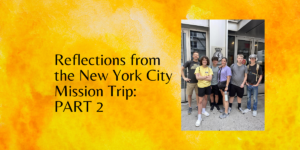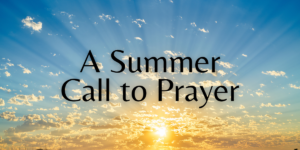A CARTOGRAPHY OF JESUS’ PRAYER LIFE
A Pastoral Message based on John 11 offered to St. John’s Baptist Church of Charlotte, NC, by Senior Minister, Rev. Dennis Foust, PhD, on August 29, 2021
____________________________________________________________
PRAYER
God who is with us in every life situation, empowering us for ministry in daily life, thank you for knowing us and thank you for wanting us to know you. Continue to teach us how to pray in all terrain; in valleys and on mountaintops. And teach us that you hear every prayer. Amen.
MESSAGE
This afternoon, Paula and I will attend the funeral of a 48 year old man.
Although he was not connected to our congregation, he was woven into the tapestry of our relational life of service in this city.
He died of COVID-19.
He worked for a bank and was the father of a 15 year old daughter and a 6 year old son.
No, he was not vaccinated.
Yes, he should have been vaccinated.
His family is now processing anger and disappointment alongside their unnecessary grief.
As you know, there is a shroud covering today’s world.
Death’s pall is a constant headline as we live through this pandemic.
Our global death count of COVID-19 victims climbs toward 5 million.
650,000 of these deaths have occurred in these United States.
More than 14,000 deaths in North Carolina;
with over 1,000 deaths in Mecklenburg County.
Additional stories of lives lost in floods, wildfires, storms, crimes, wars, hurricanes,
abuses, and tragic accidents can cause us to refuse watching the news.
Messengers of death have been avoided for centuries. Yet, death is not the whole story.
Lazarus was one of Jesus’ closest friends.
Martha and Mary, sisters of Lazarus, had sent a messenger to inform Jesus
that his good friend was deathly ill.
Yet, Jesus seemed to avoid the messenger of death staying in the place where he was.
Jesus was not busy doing miracles; he was not hosting a dinner in a wealthy home.
Jesus was near the Jordan River where John the Baptist had ministered.
He had escaped there after a recent conflict near Bethany, in Judea.
This is why, two days after the messenger brought news about Lazarus, when
Jesus said to his disciples, “Let us go to Judea again,” the disciples voiced concern.
Just a few days earlier, the people of Judea took up stones to kill Jesus and them.
Now, Jesus wants to lead them back into the place of danger and risk.
Jesus told them plainly, “Lazarus is dead.”
The disciples knew that Lazarus was one of Jesus’ best friends.
Thomas, in partial vision, said, “Let us also go, that we may die with him.”
Thomas’ words reveal resoluteness; discipleship involves resolve.
Jesus walked into Bethany to find the town shrouded in death’s pall.
Four days later, the death of Lazarus was still heavy in the air.
Jesus met the grieving sisters offering them resurrection hope; they believed.
And with tears running down his face, Jesus said, “Take away the stone.”
It was in that moment of shared sorrow that Jesus prayed.
Jesus looked upward and said, “Father, I thank you for having heard me.
I know that you always hear me.”
This is one of eight stories John gives us proving Jesus’ identity as Lord of our faith.
In Bethany, shrouded in death’s pall, Jesus taught that God hears all our prayers.
In today’s world, shrouded in death’s pall, this same Living God hears every prayer.
In times of tremendous stress and distress, we need a Living God who hears us.
In Bethany, looking into death’s tomb, Jesus said, “Lazarus, come out.”
When Lazarus emerged, this dead man walking was covered with wrapped cloths.
Jesus said to them: “Unbind him, and let him go.”
Jesus once said to his disciples, “I have called you friends.” You are friends of God.
No matter what type of death or grief is shrouding you today, Jesus has a word for you.
“Let new life emerge; Unbind that which is limited and let it find new life.”
God is in the life-giving business; God is in the resurrection business; God steps into
situations like Bethany and replaces sorrow with rejoicing.
God steps into situations like pandemics and offers new life.
What new life are you discovering through this pandemic?
Are you learning a deeper trust?
Are you internalizing a brighter hope?
Are you seeing different perspectives of how God is at work in your life? In our world?
Are you resetting your life rhythms to God’s timing?
Are you being renewed in your relationship with God?
Are you allowing God’s promises to strengthen the foundation of your life?
Are you exploring new dimensions of prayerfulness?
Are you reprioritizing your life so as to be more attentive to God’s life within you?
Are you finding external changes have more meaning when they are motivated by
spiritual commitments?
Are you realizing how deeply you value your good friends and spiritual family?
Glance back at Bethany and see Lazarus’ sister, Martha, offer stinging words to Jesus:
“If you had been here, my brother would not have died.”
Her words were so honest – and her complaints were representative of our thoughts.
Since deaths occur, we are extremely grateful for God’s hope and assurance.
However, we don’t really want God to show up during trouble, we want God to prevent it.
We want God to prevent pandemics, wars, car accidents, diseases, crimes, floods, fires, etc.
In June, 1985, I pounded on the doors and windows of a funeral home one night.
I wanted to hold Emily, our infant daughter, Rachael’s twin, one more time.
But, nobody answered the door.
That was the night that I voiced my complaints to God.
I shouted at God: “Where were you? Couldn’t you protect one baby girl?
Paula and I have committed our lives to be your servants and are pursuing preparation
in seminary to offer our best to your people.
All you had to do was take care of these two little girls.”
It was an overflow of emotion; similar to the words of Martha, the sister of Lazarus.
It was an honest complaint to a loving God of hope.
I didn’t want God to show up after the crisis; I wanted God to prevent it.
Over these intervening years, God has used that crisis to help me grow spiritually.
Her tombstone includes the words of Nathan, our oldest son, who was five at the time:
“She will always live in our hearts.”
I do not believe God caused Emily’s death; nor do I believe God was inactive or inattentive.
God was with us in the midst of that experience and blessed us with Caleb the next year. Caleb, Rachael and Nathan continue to bring blessings and joy into our lives.
Emily still lives in our hearts.
During this summer of regathering, we have been ‘ALL TOGETHER THROUGH PRAYER.’
We have walked through each phrase of The Lord’s Prayer.
We have reviewed Jesus’ teachings about prayer and considered the prayers of Jesus.
We have offered prayer lists of shared emphases for each day of regathering this summer.
We have introduced quotations on prayer.
Thank you for your investments in this emphasis, ‘ALL TOGETHER THROUGH PRAYER.’
I am grateful to our staff and others who have joined me to offer messages this summer.
What we have done this summer is spiritual cartography.
Cartography is the science and practice of drawing maps.
This summer, we have traced a map of Jesus’ healthy and vital prayer life.
Jesus prayed in times of thanksgiving and in experiences of anguish and grief.
Jesus’ prayer life shows us how:
Prayer is communion with God;
Prayer reveals our relationship with God and our trust in God;
Prayer expresses our worship of God; and
Prayer offers and renews our commitments to God.
Jesus’ prayer life shows us that God is with us in all terrains, mountaintops and valleys.
Jesus shows us how to pray to a God who is love; always helping us grow spiritually.
Beloved, this is the last Sunday of our 99th church year.
More than 100 years ago, in the midst of the Spanish Flu pandemic, some Baptists started
praying about a new church in this changing section of Charlotte.
For 10 decades, we have been unbinding God’s new life, helping spiritual freedom emerge.
It seems apropos that we begin our 100th church year, during a pandemic.
Like those Baptists of 100 years ago, we are following a map of Jesus’ prayer life.
Let us renew ourselves to God through prayer as we look into our second century.
The freedom of prayer is one of the gifts we have inherited from our Baptist ancestors.
In 1608, as a group of free church people gathered in Amsterdam of The Netherlands, they
focused on prayers; their worship services included a minimum of four prayers.
Those people practicing spiritual freedom were called Baptists and migrated to England.
In England, King James and The Church of England refused to allow them to pray freely.
All prayers had to be sanctioned by the Church of England; Baptists were arrested.
Yet, Baptists persisted.
They met in barns, in wooded areas, in caves, and – when arrested – behind prison bars.
As Baptists came to the colonies, they enjoyed their new freedom in prayer.
Today, perhaps our greatest weakness in our freedom to pray is our failure to use our freedom to pray more fully.
Yes, friends of God, there is a shroud covering today’s world.
Death’s pall is a constant headline.
However, we are following the map Jesus has given to us passed along by our ancestors.
We are not living according to a map of religion ABOUT Jesus, as drawn by other people.
We are following the map of new life revealed in the religion OF Jesus.
Through prayer, we are helping new life emerge in us, among us and through us.
So, we step into our 100th church year following Jesus ALL TOGETHER THROUGH PRAYER.
We use our spiritual freedom to unbind that which hinders us allowing new life to emerge.
Amen and AMEN.









